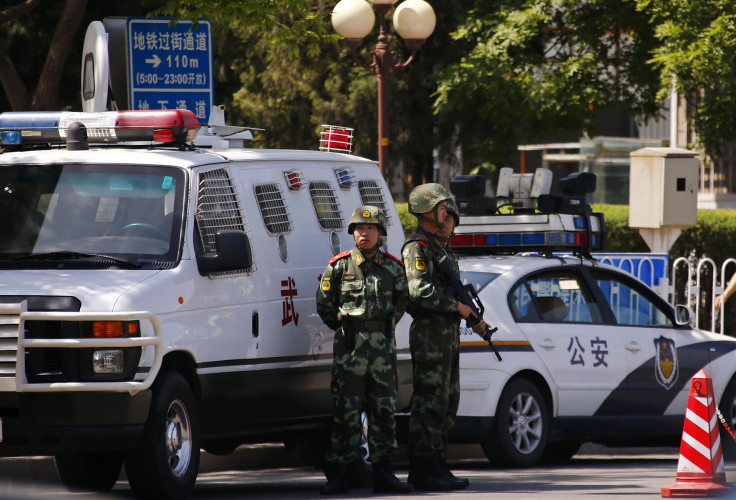China Executes 13 For Xinjiang Attacks After Three Receive Death Sentence For Tiananmen Square Car Attack

Chinese authorities sentenced three people to death Monday for a deadly attack in Tiananmen Square last October that was blamed on Islamist militants, as 13 others were executed for “terrorist attacks and violent crimes.”
While China usually keeps its death penalty statistics a state secret, an announcement confirmed a continuing crackdown on terrorism. According to state-run media, three people were sentenced to death for being the ringleaders of a terrorist plot, intentionally plowing a speeding SUV into a crowded section of Tiananmen Square, killing five bystanders and injuring dozens. Three people inside the vehicle also died.
Xinhua reported that Husanjan Wuxur, Yusup Umarniyaz, and Yusup Ahmat were condemned to die for “organizing and leading a terrorist group and endangering public security with dangerous methods.” Two others, Gulnar Tuhtiniyaz and Bujanat Abdukadir, received a life sentence and 20 years in prison, respectively, for their participation in a “terrorist group.”
The remaining three, Tohti Mehmat, Tursunjan Abliz and Abla Niyaz, received a lighter sentence of five to 10 years in prison. The attack was the first act of alleged terrorist violence in the highly secure capital city in recent memory. The names indicate that the accused are ethnic Uighurs, not Han Chinese.
Following the verdict in the Tiananmen Square trial, Xinhua also reported that 13 people associated with seven different cases of terrorism in Xinjiang had been executed. According to the report, three of the executed people had been convicted for organizing and leading an attack that killed 24 police officers and civilians and injuring an additional 23 people last June.
A recent spate of violence has been concentrated in the country’s western regions, particularly Xinjiang province. The restive region is home to China’s population of ethnic Uighurs, a majority-Muslim group that includes some separatists who have been waging a violent campaign against Chinese targets. Tensions between Uighurs and ethnic Han Chinese as a result of a mixture of cultural and economic factors have only been further compounded as the result of increased cases of violence in various Chinese cities, many of which involved Uighur extremists.
Sunday, Chinese media reported that three knife-wielding men stormed a chess hall in Hotan, Xinjiang, attacking a group of people playing chess, injuring four. Two of the attackers were killed by armed police officers, while the third was subdued and arrested.
© Copyright IBTimes 2024. All rights reserved.












